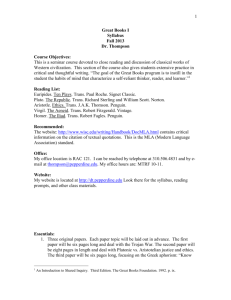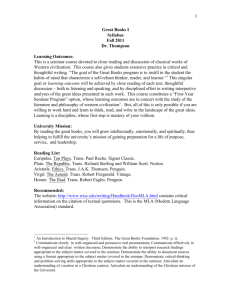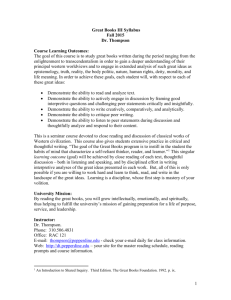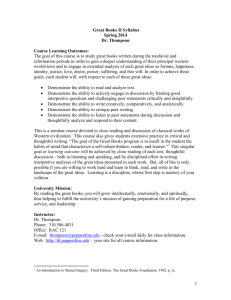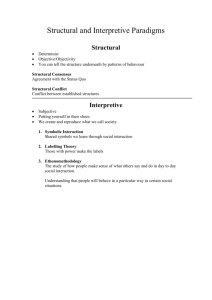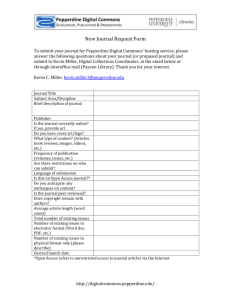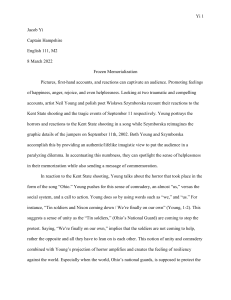GREAT BOOKS IV SYLLABUS Spring 2013 Course Goals
advertisement
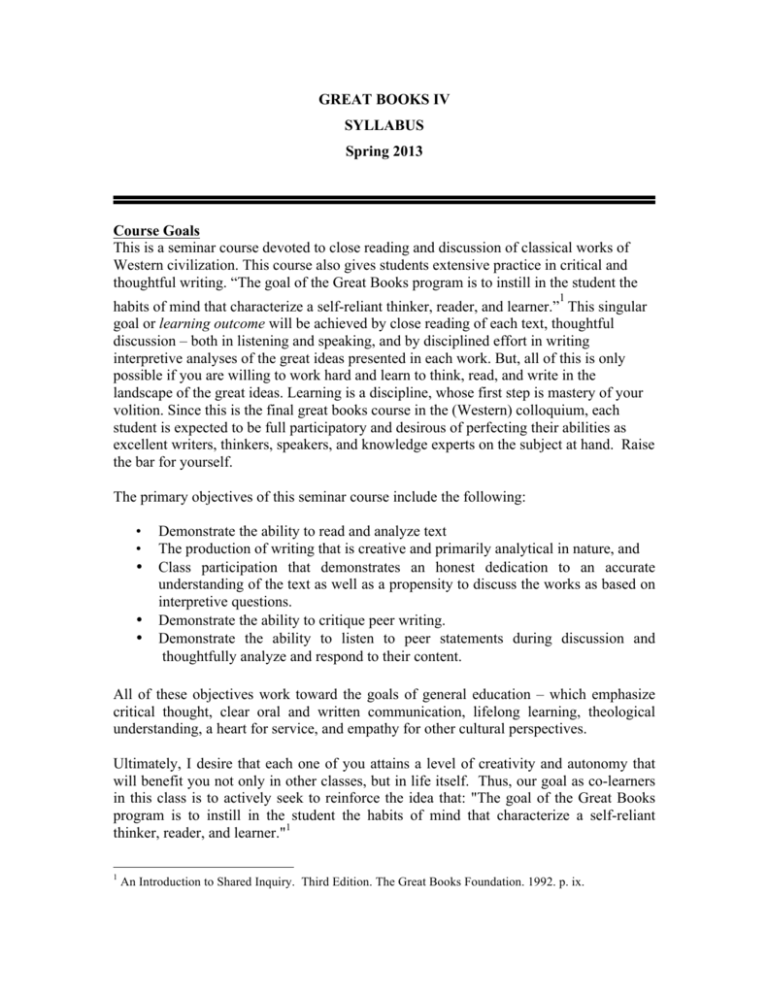
GREAT BOOKS IV SYLLABUS Spring 2013 Course Goals This is a seminar course devoted to close reading and discussion of classical works of Western civilization. This course also gives students extensive practice in critical and thoughtful writing. “The goal of the Great Books program is to instill in the student the 1 habits of mind that characterize a self-reliant thinker, reader, and learner.” This singular goal or learning outcome will be achieved by close reading of each text, thoughtful discussion – both in listening and speaking, and by disciplined effort in writing interpretive analyses of the great ideas presented in each work. But, all of this is only possible if you are willing to work hard and learn to think, read, and write in the landscape of the great ideas. Learning is a discipline, whose first step is mastery of your volition. Since this is the final great books course in the (Western) colloquium, each student is expected to be full participatory and desirous of perfecting their abilities as excellent writers, thinkers, speakers, and knowledge experts on the subject at hand. Raise the bar for yourself. The primary objectives of this seminar course include the following: • • • • • Demonstrate the ability to read and analyze text The production of writing that is creative and primarily analytical in nature, and Class participation that demonstrates an honest dedication to an accurate understanding of the text as well as a propensity to discuss the works as based on interpretive questions. Demonstrate the ability to critique peer writing. Demonstrate the ability to listen to peer statements during discussion and thoughtfully analyze and respond to their content. All of these objectives work toward the goals of general education – which emphasize critical thought, clear oral and written communication, lifelong learning, theological understanding, a heart for service, and empathy for other cultural perspectives. Ultimately, I desire that each one of you attains a level of creativity and autonomy that will benefit you not only in other classes, but in life itself. Thus, our goal as co-learners in this class is to actively seek to reinforce the idea that: "The goal of the Great Books program is to instill in the student the habits of mind that characterize a self-reliant thinker, reader, and learner."1 1 An Introduction to Shared Inquiry. Third Edition. The Great Books Foundation. 1992. p. ix. University Mission By reading the great books, you will grow intellectually, emotionally, and spiritually, thus helping to fulfill the university’s mission of gaining preparation for a life of purpose, service, and leadership. Instructor Don Thompson Phone: 310.506.4831 Office: RAC 121 E-mail: thompson@pepperdine.edu Office Hours M 2-3, R 2-3, and by appointment. Reading List Kierkegaard, Soren. Fear and Trembling. Trans. Alastair Hannay. New York: PenguinBooks, 1985. Nietzsche, Friedrich. On the Genealogy of Morals. Trans. Walter Kaufmann. Vintage Books. 1989. Dostoevsky, Fyodor. The Brothers Karamazov. Trans. Constance Garnett. Dover Thrift Edition, 2005. Darwin, Charles. The Origin of Species. Signet Classics. 2003. Kawabata, Yasunari. Beauty and Sadness. Trans. Howard S. Hibbett. New York: Vintage Books, 1975. Szymborska, Wislawa. View With a Grain of Sand. Trans. Stanislaw Baranczak and Clare Cavanagh. New York: Harcourt Brace, 1993. Discussion (5%) Each student is expected to be participatory on a daily basis. Make it a consistent habit to be prepared with several interpretive questions daily. Your participation will be graded each day based on the quality, quantity, insight, textual application and knowledge that you offer. Class Cancellation Days I am out of town on February 21 & March 14. For these days, class will not meet, but I expect you to keep up with the reading. Attendance You have two free absences beyond the cancellation dates just listed. After that, your final course grade will be lowered 1.5% per absence. Use the two free ones wisely. Biweekly Writing Assignments (20%) Each writing assignment is based on a prompt given by the instructor, as a function of the current reading material we are covering. Each paper is to be two pages in length, and is to be turned at the beginning of class on hard copy adhering to basic MLA format. The papers are due on the following dates: January 14; January 28, February 11, March 4, March 18, April 1, & April 15. Late papers receive a score of zero. NO ELECTRONIC SUBMITTALS. Be prepared to share your writing with the class – that is, be prepared both to receive and to give constructive criticism. The nature of each biweekly writing assignment will be determined by the instructor. They each will be one of the following: interpretive/analytic, genre mode, great ideas “Syntopicon” based, instructor wildcard, or student freestyle. Aim for professional quality writing worthy of publication, wherein there is a distinct thesis, a clear argument, and creative thought. Use text judiciously and with discrimination. Avoid using first person. Be sure to form a definite position that can be explicated via the text. You may only use texts from the Great Books Colloquium reading list. Each paper should be a product of analytical thought and careful analysis presented in a creative form. Each paper will be graded as follows: Title and Opening – 1 point, Thesis – 3 points, Argument – 3 points, Text Selection and Analysis – 2 points, Editing – 1 point. Total – 10 points. Reading/Discussion Schedule (days) Kierkegaard – 3, Nietzsche – 4, Dostoevsky – 10, Darwin – 3, Kawabata – 2, Szymborska – 3 Extended Writing (75%) You must complete three extended writing assignments, in the form of papers that represent a fully developed version of one or more of your biweekly writing assignments. The first paper, worth 15%, is to be 4 -5 pages in length, and is to be based solely on Kierkegaard. This paper is due January 22 at 11:59 p.m. The second paper, worth 35%, is to be 8-9 pages in length, and is to be based on Nietzsche and Dostoevsky. This paper is due by March 30 at 11:59 p.m. The last paper, worth 25%, is to be 6-7 pages in length, and is to touch on at least three authors from this course, at least one of whom must be Kawabata, Szymborska, or Darwin. It is due April 25 at 11:59 p.m. Each extended writing submittal is graded on the following basis: Thesis Thesis Statement Well Structured Plan Analysis Thesis Execution Logical Completeness 5 Logical Flow Text Appropriately Chosen Sufficiently Explained 10 10 10 5 10 10 Risk/Interest Interesting Reading Creativity Strong Conclusion Language Mature Vocabulary Varied/Interesting Sentence Structure Mechanics Punctuation Spelling Total 10 5 5 5 5 5 5 100 Anonymity All writing is to be submitted with no name. Instead, affix your College Wide ID to the paper on the last page, after the "Works Cited" section. This will ensure that I evaluate your writing objectively and honestly. Plagiarism: May result in an automatic failure in the class. It is plagiarism if you (1) borrow a paper from another student, (2) turn in a paper written by any other person, (3) take material (pages, paragraphs, sentences, or ideas) from any printed source without giving credit. See http://seaver.pepperdine.edu/academicintegrity. Disability Services: Any student with a documented disability (physical, learning, or psychological) needing academic accommodations should contact the Disability Services Office (Main Campus, Tyler Campus Center 264, x6500) as early in the semester as possible. All discussions will remain confidential. Please visit http://www.pepperdine.edu/disabilityservices/ for additional information. Help on writing: Take advantage of my availability for help on writing your papers. You may submit rough drafts in advance of the due date for any paper. Do this by anonymous e-mail attachment by setting up a generic account with a commercial e-mail provider (gmail, yahoo, ...).We also have an excellent writing center located in CAC 123, x4097. See http://seaver.pepperdine.edu/writingcenter/ Recommended: The website: http://www.wisc.edu/writing/Handbook/DocMLA.html contains critical information on the citation of textual quotations. This is the MLA (Modern Language Association) standard.
